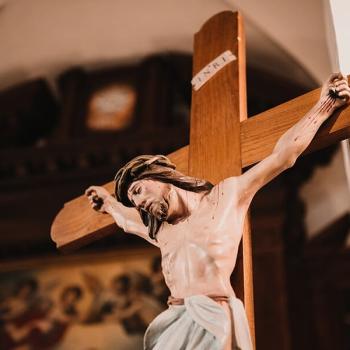“The way we view the crucifixion of Jesus and the posture of God when that happened affects everything we think about God. It affects how we pray, how we worship, even how we raise our children. We can’t afford to get it wrong.” — Tony Jones, author of Did God Kill Jesus?
Tony Jones, popular theologian, speaker, blogger, and a founder of the emergent church movement, has an important new book out this week, perfectly timed for Holy Week. Did God Kill Jesus? Searching for Love in History’s Most Famous Execution (HarperOne) takes the central symbol of the Christian faith, the cross — and specifically its most popular understanding as Jesus’ sacrifice for our sins — head on, and boldly asks whether we’ve been getting it wrong all these years. At once a sweeping historical review of atonement theory (why Jesus died) and a compelling theological appeal toward a more gracious, more biblically-sound meaning of the cross for us today, Did God Kill Jesus? is riveting and essential reading for all of us who seek to follow and proclaim a God of love to a suffering world.
 A few days into the launch of DGKJ, Jones took some time to answer a few questions about the book and his theological shiftings on the most central event of the Christian story.
A few days into the launch of DGKJ, Jones took some time to answer a few questions about the book and his theological shiftings on the most central event of the Christian story.
First of all, that’s some title! Beyond being wildly provocative, is there another reason you framed the question for your book this way, versus, say, “Why Did Jesus Die?”
As a theologian, it’s the theological question that’s most interesting to me. As important as the historical and political circumstances around Jesus’ death are, it’s really the theological mystery that keeps me up at night. Why did it have to happen like this? Could God have saved us another way? Why did Jesus bring a message of peace, but die in such a violent way?
I think that God is somehow implicated in all of this, and that’s what I’m trying to figure out.
You’ve been working on this book for nearly five years now. Why is what happened on the cross so important to you?
I was talking to a friend yesterday, and she told me that the cross has been the single most troubling aspect of Christianity since she was young. She said that when she was a young mother, a friend told her that her children were really the Lord’s and that she should give them up to God. And my friend’s first thought was, I don’t know if I trust God with children after what he did to his own son!
The way we view the crucifixion of Jesus and the posture of God when that happened affects everything we think about God. It affects how we pray, how we worship, even how we raise our children. We can’t afford to get it wrong.
For many Christians, there is one way of understanding the cross – that of “penal substitution, ” or Jesus died for our sins. What’s wrong with this understanding, in your opinion?
In Did God Kill Jesus? I call that the Payment view of Jesus’ death, and I explain how it’s been expanded to a Payment/Penalty/Punishment view. It’s the most popular view among Western Christians right now, but it’s also problematic. The biggest problem with the Payment model is that it pits the Father against the Son. The Bible is clear that the Father and the Son are unified in love and in purpose, but the Payment model of the atonement says that God comes after Jesus to pay for sins that he didn’t commit.
While the “payment” view is the most popular understanding of the crucifixion, you assert it is far from the only explanation throughout Christian history. What are some of the other plausible explanations and why don’t we hear more about them?
Well, for one thing, Protestantism hasn’t been that great at history. A lot of us were raised in church that pretty much ignored everything that happened before the Reformation. Thankfully, we’ve gotten better at that recently, but it means that some of the earlier views of the atonement aren’t as well known.
And the Payment view of the atonement, I argue in the book, is popular now because it accords with our modern sensibilities. We live in the most litigious society in the history of humankind, so it makes sense to us to think that when a crime has been committed, a person must “pay their debt to society.” That sense of justice appeals to us. But that’s not how God works. That’s us imposing our ideas of justice on God.
In the book, I introduce the historic theories of the atonement with new language, that I hope makes it easier for people to understand: Victory, Magnet, Divinity, and Mirror, as well as the more recent contextual readings by feminist, Black, Asian, and radical theologians. It’s really a beautiful pastiche of theories when you step back and look at it.
The subtitle of your book is “Searching for Love in History’s Most Famous Execution.” Why is love the lynchpin for you?
Love is the key to everything. It’s clear from the beginning of scripture that God loves humanity and all of creation, and it’s clear in the New Testament that Jesus came to preach about and display that love. So, as I said earlier, the love between Father and Son must be central to any understanding of the crucifixion.
Coming to a new view of the cross that exemplifies love isn’t necessarily easy. It takes a more nuanced and complex view of God than that Payment view does. But if we can leave the view that the crucifixion was a transaction between God and Jesus, then we can see how it is instead an act of self-sacrificial love by God. The crucifixion is God’s ultimate act of solidarity with humanity and with all of creation.
Do we have to read the book to discover where you land on what really happened on the cross and what it means for us today, or can you give us a hint?
I gave a hint in that last answer. 🙂 My view of the atonement is that it is God’s identification with our situation. God dives into the deep end of the pool with us.
Who did you write this book for? Who do you most hope reads it?
Well, I think most authors would say they first wrote the book for themselves. And that’s true for me. I really wanted to solve this mystery. But I also hope that a lot of people will read it who are on the edge – on the edge of faith, on the edge of going to church, on the edge of belief because they’re troubled by a view of a wrathful God.
What questions do you hope get raised by your book?
You know what I hope? I hope that people will ask their preachers to think of new ways to preach the cross – ways that are life-giving and hopeful and wondrous. I hope that people will question their views of God and turn to more loving views, and that they will challenge those who’ve given up on God to give God another chance.
Finally, given your own understanding of the crucifixion, what does the resurrection mean for you? How do you understand what happened on Easter?
I’ll answer that closing question with a quote from the book:
The resurrection of Jesus is the capstone of the drama that is his life and passion. It’s the proof of God’s power and, as Paul says, a down payment on the resurrection that each one of us is promised. Without the resurrection, Jesus of Nazareth would have been just another religious martyr. His would have been an inspirational death, but it would have had no cosmic import.
Some today—even Christian theologians—find the resurrection passé. God doesn’t break the laws of physics, they say, and God doesn’t bring people back from the dead. Not even himself. Even if the disciples did encounter Jesus after his death, what they saw was a spirit, an apparition. His body stayed in the donated tomb, they say, and believers changed the story to make it more dramatic.
But in Jesus we’ve found that God is extraordinarily interested in what it means to be human. And nothing is more constitutive of our humanness than our bodies. Remember those in the early church who thought that the divinity of Jesus got vacuumed out of him just before he died? They were condemned because that radical bifurcation between the body and spirit of Jesus has long been rejected by the church. It’s the same on his resurrection day—we should reject any notion that attempts to divorce Jesus’ spirit from his body. Jesus was resurrected in toto, body and spirit, humanity and divinity.
God’s commitment to our humanity is complete. It didn’t end at the tomb. The true solidarity that united us with God because of Jesus’ death becomes glorious and everlasting in his new life on Easter morning. And Jesus’ death—all the theories about it, all the questions and debates—only has meaning because of his resurrection.
Tony Jones is theologian-in-residence at Solomon’s Porch in Minneapolis and teaches theology at United Theological Seminary of the Twin Cities and Fuller Theological Seminary. He is the author of a dozen books, including his latest, Did God Kill Jesus? Visit his website here.












